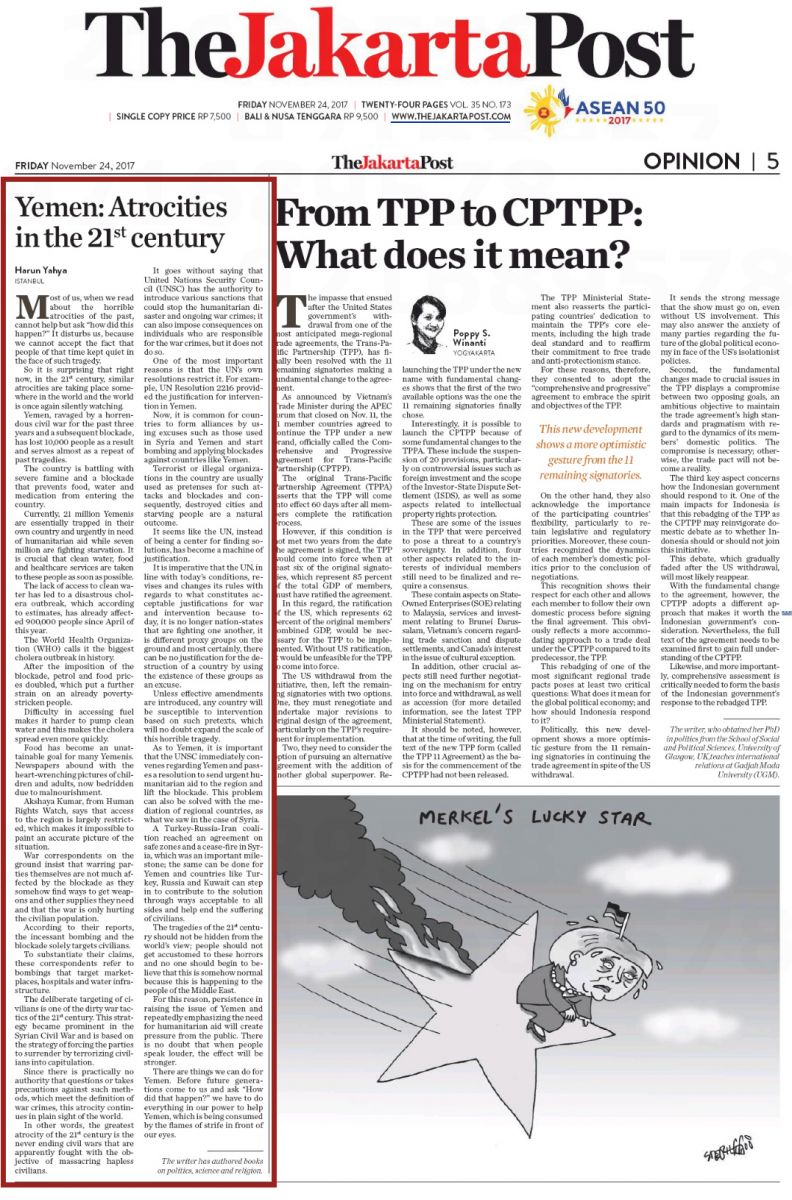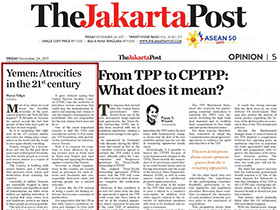
Most of us, when we read about the horrible atrocities of the past, cannot help but ask "how did this happen?". It disturbs us, because we cannot accept the fact that people of that time kept quiet in the face of such tragedy. So it is surprising that right now, in the 21st Century, similar atrocities are taking place somewhere in the world and the world is once again silently watching.
Yemen, ravaged by a horrendous civil war for the past three years and a subsequent blockade, has lost 10,000 people as a result and serves almost as a repeat of past tragedies. The country is battling with severe famine and a blockade that prevents food, water and medication from entering the country. Currently, 21 million Yemenis are essentially trapped in their own country and urgently in need of humanitarian aid while seven million are fighting starvation. It is crucial that clean water, food and health-care services are taken to these people as soon as possible. The lack of access to clean water has led to a disastrous cholera outbreak, which according to estimates, has already affected 900,000 people since April of this year. The World Health Organizaiton (WHO) calls it the biggest cholera outbreak in history.
After the imposition of the blockade, petrol and food prices doubled, which put a further strain on an already poverty-stricken people. Difficulty in accessing fuel makes it harder to pump clean water and this makes the cholera spread even more quickly. Food has become an unattainable goal for many Yemenis. Newspapers abound with the heart-wrenching pictures of children and adults, now bedridden due to malnourishment.
Akshaya Kumar, from Human Rights Watch, explains that access to the region is largely restricted, which makes it impossible to paint an accurate picture of the situation. War correspondents on the ground insist that warring parties themselves are not much affected by the blockade as they somehow find ways to get weapons and other supplies they need and that the war is only hurting the civilian population. According to their reports, the incessant bombing and the blockade solely targets civilians. To substantiate their claims, these correspondents refer to bombings that target marketplaces, hospitals and water infrastructure.
The deliberate targeting of civilians is one of the dirty war tactics of the 21st Century. This strategy became prominent in the Syrian Civil War and is based on the strategy of forcing the parties to surrender by terrorizing civilians into capitulation. Since there is practically no authority that questions or takes precautions against such methods, which meet the definition of war crimes, this atrocity continues in plain sight of the world: In other words, the greatest atrocity of the 21st Century is the never ending civil wars that are apparently fought with the objective of massacring hapless civilians.
What is the UN doing in the face of this dire situation? It goes without saying that UN Security Council has the authority to introduce various sanctions that could stop the humanitarian disaster and ongoing war crimes; it can also impose consequences on individuals who are responsible for the war crimes, but it does not do so. One of the most important reasons is that the UN’s own resolutions restrict it. For example, UN Resolution 2216 provided the justification for intervention in Yemen. Now, it is common for countries to form alliances by using excuses such as those used in Syria and Yemen and start bombing and applying blockades against countries like Yemen. Terrorist or illegal organizations in the country are usually used as pretenses for such attacks and blockades and consequently, destroyed cities and starving people are a natural outcome. It seems like the UN, instead of being a center for finding solutions, has become a machine of justification.
I have many times written about the need to make changes to UN rules. It is imperative that the UN, in line with today’s conditions, revises and changes its rules with regards to what constitutes acceptable justifications for war and intervention because today, it is no longer nation-states that are fighting one another, it is different proxy groups on the ground and most certainly, there can be no justification for the destruction of a country by using the existence of these groups as an excuse. Unless effective amendments are introduced, any country will be susceptible to intervention based on such pretexts, which will no doubt expand the scale of this horrible tragedy.
As to Yemen, it is important that the UN Security Council immediately convenes regarding Yemen and passes a resolution to send urgent humanitarian aid to the region and lift the blockade. This problem can also be solved with the mediation of regional countries, as what we saw in the case of Syria. A Turkey-Russia-Iran coalition reached an agreement on safe zones and a cease-fire in Syria, which was an important milestone; the same can be done for Yemen and countries like Turkey, Russia and Kuwait can step in to contribute to the solution through ways acceptable to all sides and help end the suffering of civilians.
It is important that the public is kept informed, because very few people are aware of what is currently transpiring in Yemen due to the ongoing blockade. The tragedies of the 21st Century should not be hidden from the world’s view; people shouldn’t get accustomed to these horrors and no one should begin to believe that this is somehow normal because this is happening to the people of the Middle East. For this reason, persistence in raising the issue of Yemen and repeatedly emphasizing the need for humanitarian aid will create pressure from the public. There is no doubt that when people speak louder, the effect will be stronger.
There are things we can do for Yemen. Before future generations come to us and ask ‘How did that happen?’, we have to do everything in our power to help Yemen, which is being consumed by the flames of strife in front of our eyes.
Adnan Oktar's piece in The Jakarta Post (Indonesia):
http://www.thejakartapost.com/news/2017/11/24/yemen-atrocities-21st-century.html


